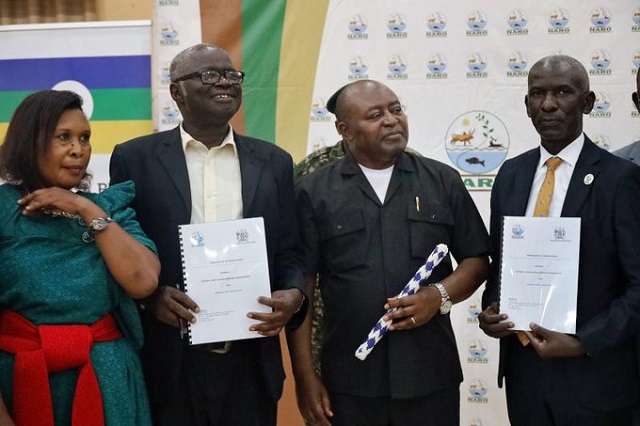
Kasese, Uganda | THE INDEPENDENT | The National Agricultural Research Organisation (NARO) has signed a Memorandum of Understanding with the Kingdom of Rwenzururu to promote transformational agriculture.
The partnership is aimed at the socio-economically uplifting communities in the Rwenzori region.
A statement from NARO on Friday said the partnership is a strategic alliance focused on enhancing the dissemination and adoption of technologies, innovations, and management practices (TIMPs) generated by NARO.
The Omusinga (King) Charles Wesley Mumbere, while witnessing the signing event held at Rwenzori International Hotel in Kasese town, described the partnership as a significant milestone in the journey towards fostering collaboration, innovation, and development of the communities in Rwenzori sub region and beyond.
“To NARO, thank you for recognizing the potential and aspirations of our people. The Memorandum signifies a new chapter in our commitment to advancing knowledge, technology, and sustainable development in our region,” the King remarked.
He observed that the partnership was laying ground for research, technological innovation and capacity-building initiatives that will benefit the communities for generations to come.
“I am therefore filled with hope and optimism for the journey that lies ahead. Let us embark on this path together, with determination and unity of purpose, knowing that through our collective efforts, we can achieve transformative change,” he said.
Over the years, NARO has developed over 1,000 technologies, innovations, and management practices geared towards sustainable agricultural transformation, aligning with the agro-industrialization goal of increasing commercialization and competitiveness of agricultural production and agro-processing.
The Director General of NARO, Dr. Yona Baguma, observed that through the partnership, the two organizations commit to collaborating in mobilizing communities, facilitating technology uptake, and providing necessary support for implementation.
He emphasized that the endeavor aligns seamlessly with the directives of President Yoweri Kaguta Museveni, who has emphasized the importance of mobilizing the masses for wealth creation in Uganda and ensuring that agriculture implementation supports the money economy.
“By working in synergy with the Ministry of Agriculture, Animal Industry and Fisheries, other Agencies of government, Local Governments, Religious and Cultural Institutions, Civil Society, Private Sector, and other stakeholders, NARO aims to amplify the impact of its initiatives and drive sustainable agricultural growth, delivering on President Yoweri Museveni’s long-standing call for wealth creation,” Dr. Baguma noted.
Under the partnership, the Kingdom of Rwenzururu will play a critical role in mobilizing the masses to embrace these advancements, while also offering land for the establishment of demonstration sites and model farms. This approach is poised to accelerate the adoption and utilization of improved technologies, fostering increased production and productivity throughout the region.
The partnership with the Kingdom of Rwenzururu adds to a host of other Memoranda of Understanding that NARO has with similar Institutions, including Tooro, Buganda, and Bunyoro Kingdoms. Preparations are also underway to formalize partnerships with the Busoga Kingdom, the Inter-Religious Council of Uganda (URCU), and other institutions across the country.
Dr. Baguma said the partnerships allow the leveraging of each entity’s strength to benefit farmers and all players along the agricultural value chain. He noted that the persistence of poverty among players in the agricultural sector is a result of low uptake and utilization of technologies that have been developed to support agriculture as an engine of economic growth.
“There is great potential to change the situation and improve livelihoods in the sector through the utilization of the developed technologies—from improved seeds to value-added prototypes to machinery that reduces human drudgery—transformation can be swift with adaptability,” he said.
******
URN
 The Independent Uganda: You get the Truth we Pay the Price
The Independent Uganda: You get the Truth we Pay the Price



